Buffy Sainte-Marie's "Quiet Places": A Deep Dive into Musical Exploration and Social Commentary Released in 1973, "Quiet Places" marked a pivotal moment in Buffy Sainte-Marie's already prolific career. It was an era of change and upheaval, with the Vietnam War, the American Indian Movement, and various social justice movements taking center stage. Sainte-Marie, never one to shy away from difficult topics, used her music as a platform to address these issues head-on.
Historical Context and Musical Exploration
In the early 1970s, folk music was undergoing a transformation. Artists were experimenting with new sounds and styles, incorporating elements of rock, country, and even electronica. Sainte-Marie, always an innovator, embraced this musical exploration, infusing "Quiet Places" with a diverse range of sounds.
The album seamlessly blends folk, country, and rock elements, showcasing Sainte-Marie's versatility as a songwriter and performer. It features acoustic ballads, upbeat rockers, and even a few experimental tracks that incorporate electronic sounds and synthesizers. This eclectic mix of styles reflects the changing musical landscape of the time, as well as Sainte-Marie's willingness to push boundaries and challenge expectations.
Genre-Bending Sounds
Sainte-Marie's musical style on "Quiet Places" is a unique blend of folk, rock, and country, with a touch of psychedelia and experimentalism. Her voice, a powerful instrument in its own right, is capable of both tender vulnerability and fierce defiance. This dynamic vocal range is perfectly suited to the album's diverse range of songs, from introspective ballads to politically charged anthems.
The instrumentation on "Quiet Places" is equally eclectic. Acoustic guitars, pianos, and strings provide a foundation for Sainte-Marie's vocals, while electric guitars, drums, and even synthesizers add a rock edge to the sound. This fusion of acoustic and electric instrumentation creates a unique sonic landscape that is both familiar and innovative.
Production Team and Recording Studio
"Quiet Places" was produced by Norbert Putnam, a renowned producer who had worked with artists like Elvis Presley and Joan Baez. Putnam's expertise helped to shape the album's sound, bringing a polished yet organic feel to the recordings.
The album was recorded at Quadrafonic Sound Studios, a state-of-the-art facility that allowed for experimentation with new recording techniques. This, combined with Sainte-Marie's creative vision and Putnam's production skills, resulted in an album that was both sonically adventurous and emotionally resonant.
Controversies and Social Commentary "Quiet Places" is not without its controversies. Some critics found the album's political message to be too heavy-handed, while others praised Sainte-Marie for her courage and conviction. Regardless of one's stance, there's no denying that "Quiet Places" is a powerful statement about the issues of its time.
Songs like "No One Told Me" and "For Free" address themes of social injustice and inequality, while "Now That the Buffalo's Gone" and "My Country 'Tis of Thy People You're Dying" tackle the plight of Indigenous peoples in North America. These songs are not merely protest songs; they are deeply personal reflections on the human cost of war, oppression, and environmental destruction.
Trivia: "Buffy Sainte-Marie" (born Beverly Sainte-Marie, February 20, 1941) is an Academy Award-winning Canadian First Nations musician, composer, visual artist, educator and social activist. |
Music Genre: Canadian Rock and Roll, Chill-out, Acid Folk |
Album Production Information: Produced by Norbert Putnam and Buffy Sainte-Marie |
Record Label & Catalognr: Vanguard 519060 / Stereolab / The Recordings for the Connoiseur |
Media Format: 12" Vinyl LP Gramophone RecordAlbum weight: 200 gram |
Year & Country: 1973 Made in France |
Complete Track Listing of: Buffy Sainte-Marie Quiet Places |
|
The Song/tracks on "Buffy Sainte-Marie Quiet Places" are
|
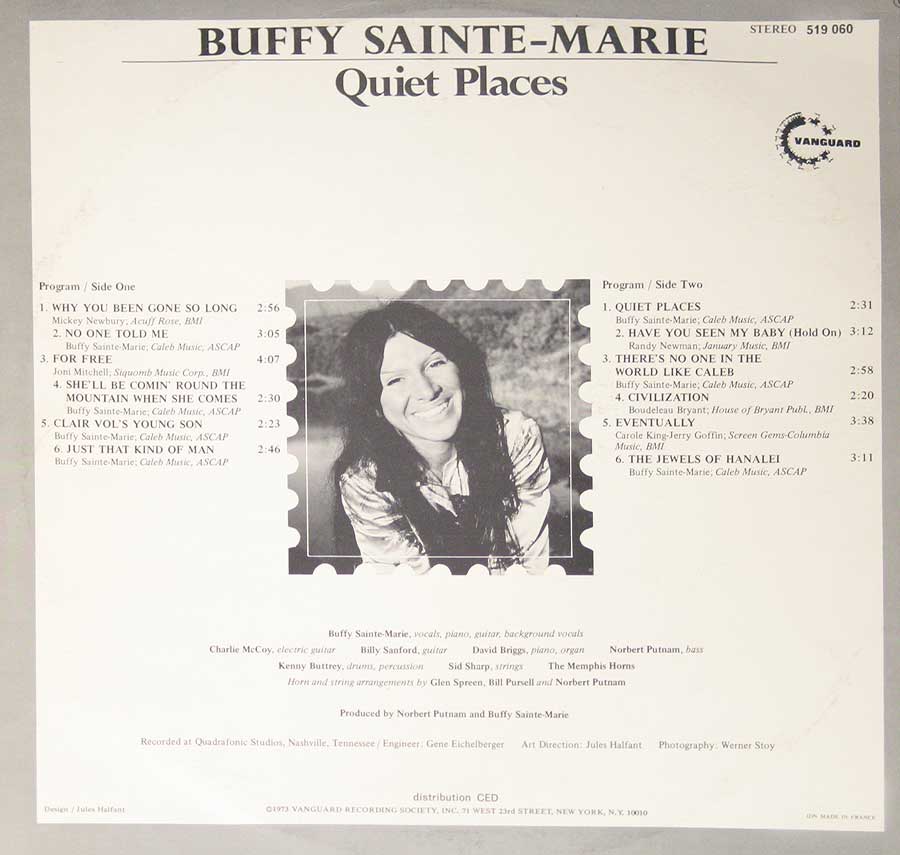
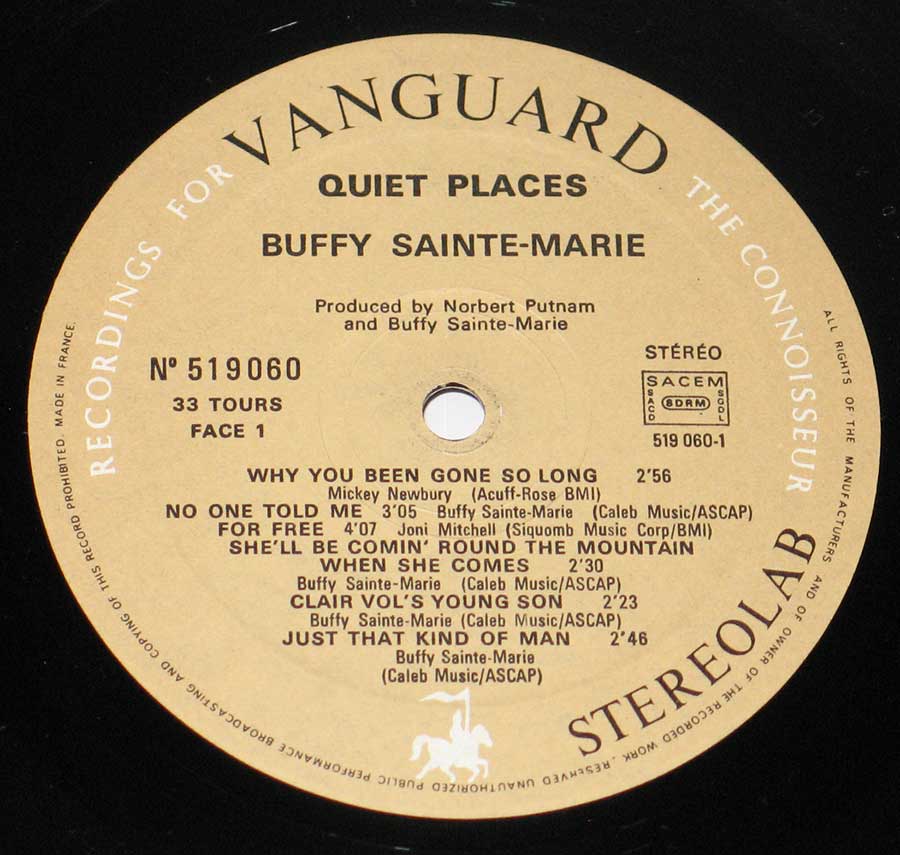
VANGUARD 519060
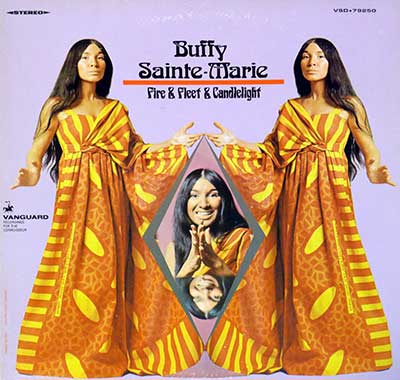
Vanguard VSD-79250 , 1967 , USA
"Fire & Fleet & Candlelight" is the fourth album by Cree singer and songwriter Buffy Sainte-Marie.
Learn more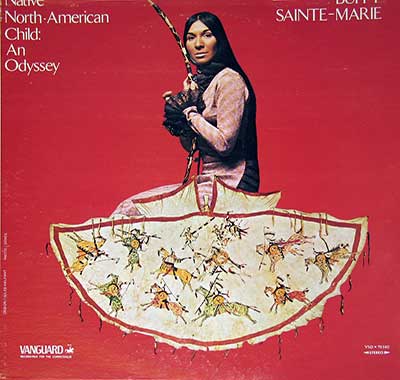
Vanguard VSD-79340 , 1974 , USA
"Native North American Child: An Odyssey" is the 1974 compilation album released after Buffy Sainte-Marie's departure from Vanguard Records.
Learn more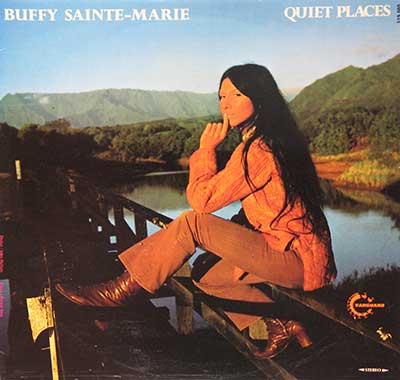
Vanguard 519060 , 1973 , France
"Buffy Sainte-Marie" (born Beverly Sainte-Marie, February 20, 1941) is an Academy Award-winning Canadian First Nations musician, composer, visual artist, educator and social activist.
Learn more